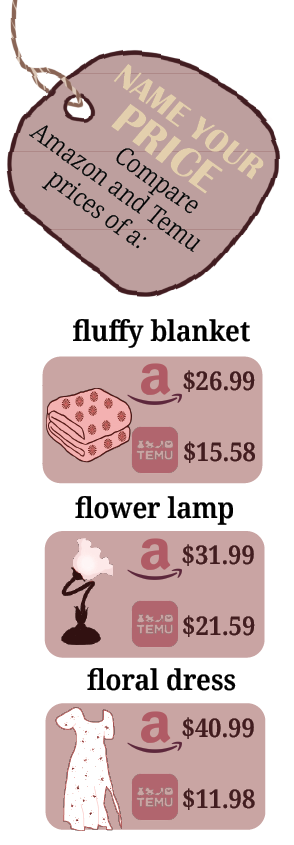“Shop like a billionaire…”

The TV emits a catchy jingle as Temu’s signature orange color floods the screen. From kitchen gadgets to fashionable attire to tool kits, a single theme connects these disparate items: affordability. Online retail giants like Temu and TikTok Shop entice customers with their astoundingly low prices, with Temu drawing particular attention in recent weeks after airing numerous advertisements during the Super Bowl commercial breaks. As consumers grow accustomed to such low price points, their perceptions of more sustainable yet pricier goods grow increasingly skewed.
Temu first launched in the United States in Sept. 2022 and quickly rose in popularity after promoting its products through popular social media influencers and pop-up ads. Offering various opportunities for discounts and coupons, the app increased in traffic due to its inexpensive products. Aman Singh, a Temu user, discovered the site through a pop-up ad and describes being surprised by the unusually cheap prices.
“That’s what basically hooked me, and I thought ‘how can shoes be this cheap and have free shipping?’” Aman said. “At first I thought it was stolen items or something, so I clicked on the pop-up ad and the website seemed legit, and it said it’s coming from China. The price was around three or four dollars for these shoes.”
Of course, the low price point comes at the cost of quality. In fact, Temu has received over 3,500 complaints in the past 12 months and currently boasts a 2.5 out of five-star rating on the Better Business Bureau (BBB). Most complaints address lengthy shipping times, mysterious credit card charges and poor customer service. Oskar Baumgarte (11) recently ordered from Temu and agrees with the lacking quality of Temu products.
“I guess the ordering was fast considering it’s from China, but the products were not very good,” Oskar said. “If you want something cheap, it’s good. But if you want something good quality, it’s not going to be good quality.”
In recent days, TikTok Shop emerged as an alternative retail platform for customers looking for higher-quality products. Launched on Sept. 12 last year, TikTok Shop attracted customers by selling products from established brands like PacSun and Flower Knows.
The popular social media app’s new shopping feature allows retailers to sell their products directly through shoppable TikTok videos, live streams and TikTok Shop ads. Young Min (11) has ordered from TikTok Shop and differentiates it from other retail stores.
“My experience with TikTok Shop has been really good,” Young said. “I think something that’s really good about TikTok Shop compared to other fast fashion platforms like Ali Express or Temu is that it supplies official small businesses as well.”
The popularity of retail platforms like Temu and Ali Express also raised concerns about excessive consumerism and product sustainability. Many customers now gravitate towards cheap retail companies instead of shopping for products from more expensive but ethical brands.
In fact, some customers also noticed how Temu often carries products identical to what they would find in-store, except for much cheaper prices. This trend reflects a common business practice known as dropshipping, where the seller acts as a middleman between the warehouse and the customer. Singh also noticed similarities between products sold on Temu and established brands.
“I bought 2 lamps on Amazon for $30 each and was super happy,” Aman said. “Recently I saw an ad on Temu with the same thing, but the lamps are only 12 bucks on Temu. So people are literally buying from Temu and selling Temu products on their own websites.”
Shopping platforms like Temu and TikTok Shop shed light on the unsustainable business practices of established online retailers like Amazon. Temu and TikTok Shop make “trendy” products more accessible to lower income consumers, which especially caters to teenagers as they often have less money. The rise of these online shopping platforms reveals the new shopping preferences of Generation Z.
According to the 2022 Afterpay report, 40% of Gen Z prefers to shop online, a higher percentage than that of Millennials and Gen X. The report also found that 43% of Gen Z would buy a product based on the recommendation of an influencer, and 49% of Gen Z enjoy shopping directly from social media, which could explain the increasing popularity of TikTok Shop. Now, sustainability serves merely as a secondary consideration.
“I think that it’s really tampered with people’s perception of good quality stuff to the point where they’re refusing to buy the good quality items,” Young said. “People instead opt to buy from these fast fashion brands that probably won’t even last them one or two years, and they will need to replace it because the quality is just so bad. They could instead buy a staple piece for a bit more money, but it’ll last them a lot longer and they won’t have to get into that cycle of overconsumption.”


















![“[Building nerf blasters] became this outlet of creativity for me that hasn't been matched by anything else. The process [of] making a build complete to your desire is such a painstakingly difficult process, but I've had to learn from [the skills needed from] soldering to proper painting. There's so many different options for everything, if you think about it, it exists. The best part is [that] if it doesn't exist, you can build it yourself," Ishaan Parate said.](https://harkeraquila.com/wp-content/uploads/2022/08/DSC_8149-900x604.jpg)




![“When I came into high school, I was ready to be a follower. But DECA was a game changer for me. It helped me overcome my fear of public speaking, and it's played such a major role in who I've become today. To be able to successfully lead a chapter of 150 students, an officer team and be one of the upperclassmen I once really admired is something I'm [really] proud of,” Anvitha Tummala ('21) said.](https://harkeraquila.com/wp-content/uploads/2021/07/Screen-Shot-2021-07-25-at-9.50.05-AM-900x594.png)







![“I think getting up in the morning and having a sense of purpose [is exciting]. I think without a certain amount of drive, life is kind of obsolete and mundane, and I think having that every single day is what makes each day unique and kind of makes life exciting,” Neymika Jain (12) said.](https://harkeraquila.com/wp-content/uploads/2017/06/Screen-Shot-2017-06-03-at-4.54.16-PM.png)








![“My slogan is ‘slow feet, don’t eat, and I’m hungry.’ You need to run fast to get where you are–you aren't going to get those championships if you aren't fast,” Angel Cervantes (12) said. “I want to do well in school on my tests and in track and win championships for my team. I live by that, [and] I can do that anywhere: in the classroom or on the field.”](https://harkeraquila.com/wp-content/uploads/2018/06/DSC5146-900x601.jpg)
![“[Volleyball has] taught me how to fall correctly, and another thing it taught is that you don’t have to be the best at something to be good at it. If you just hit the ball in a smart way, then it still scores points and you’re good at it. You could be a background player and still make a much bigger impact on the team than you would think,” Anya Gert (’20) said.](https://harkeraquila.com/wp-content/uploads/2020/06/AnnaGert_JinTuan_HoHPhotoEdited-600x900.jpeg)

![“I'm not nearly there yet, but [my confidence has] definitely been getting better since I was pretty shy and timid coming into Harker my freshman year. I know that there's a lot of people that are really confident in what they do, and I really admire them. Everyone's so driven and that has really pushed me to kind of try to find my own place in high school and be more confident,” Alyssa Huang (’20) said.](https://harkeraquila.com/wp-content/uploads/2020/06/AlyssaHuang_EmilyChen_HoHPhoto-900x749.jpeg)




